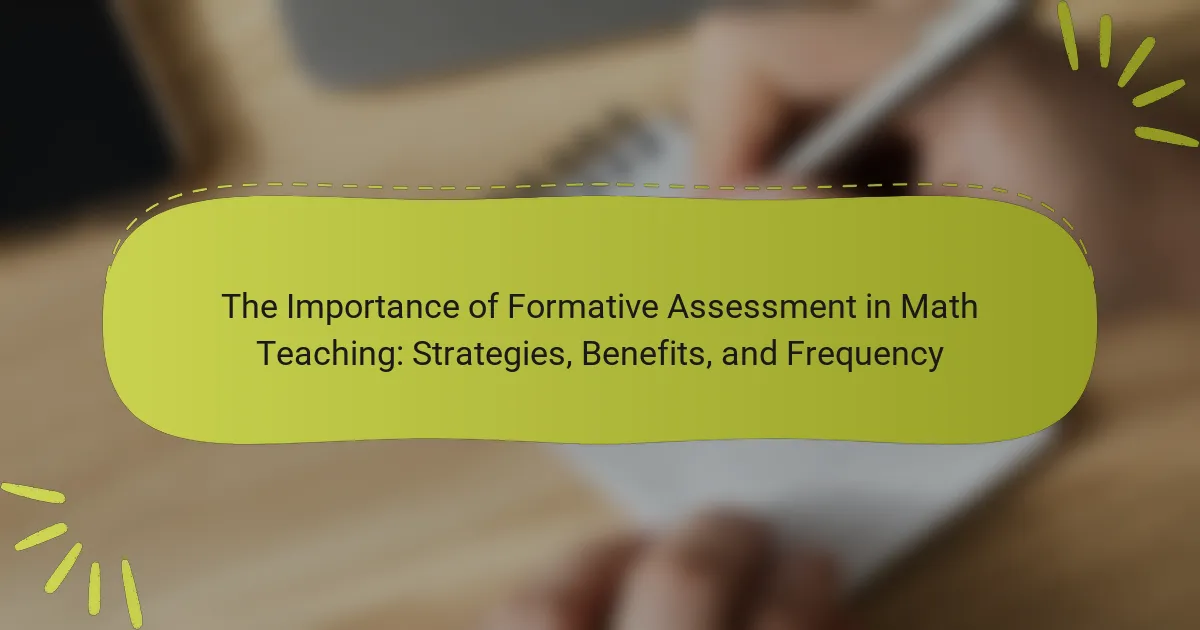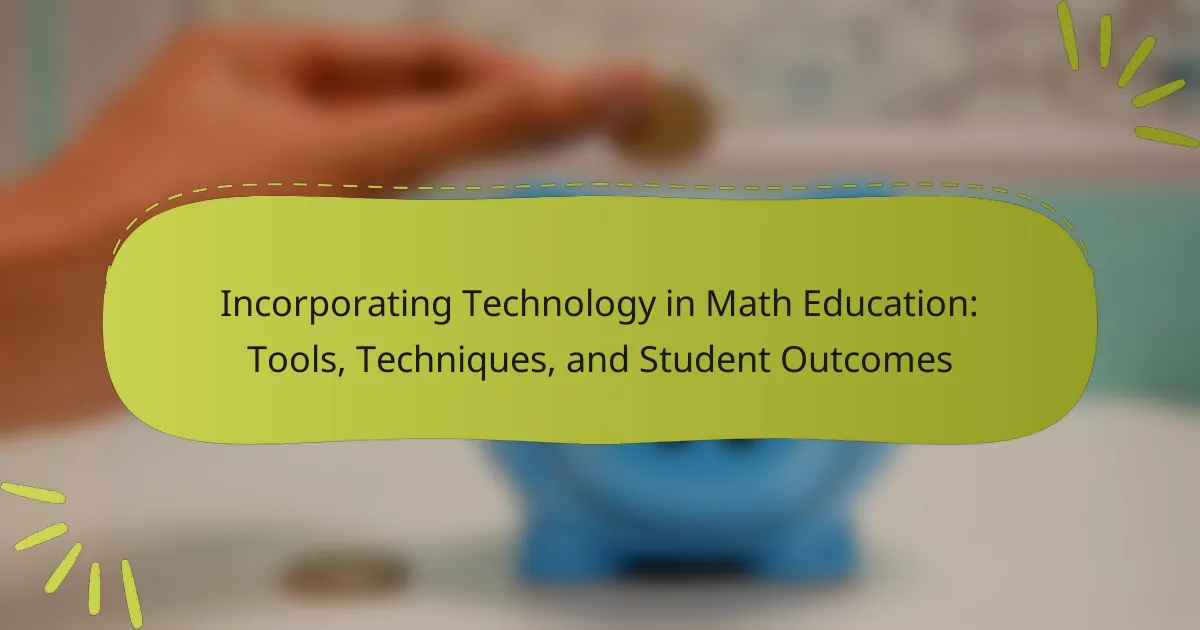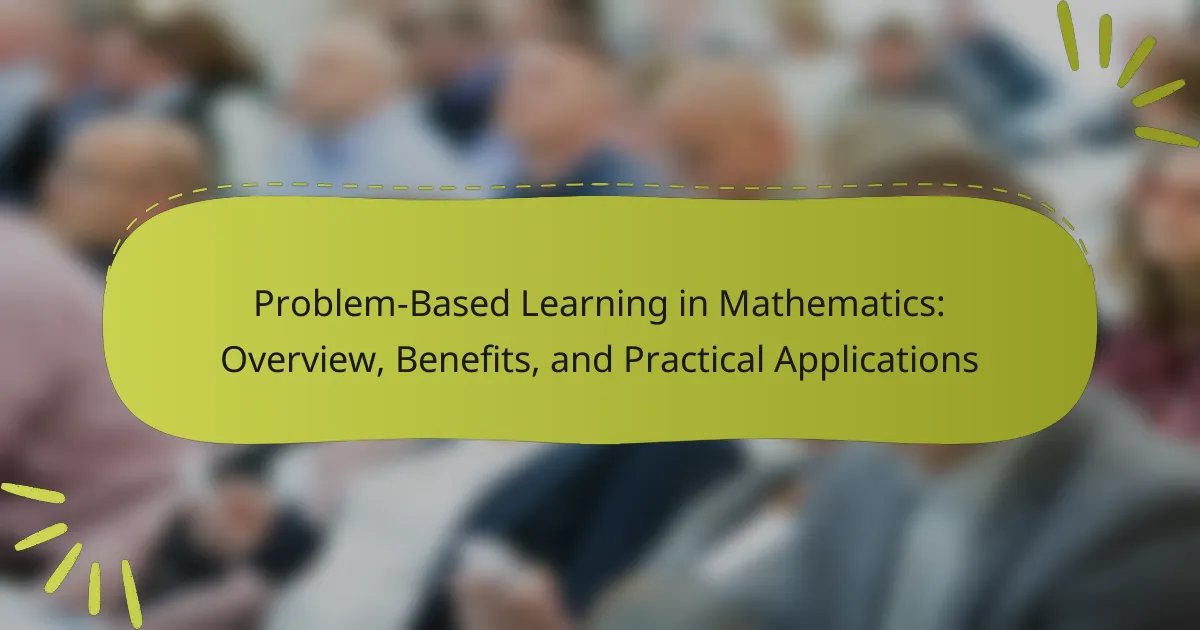The article focuses on the use of games to enhance math learning, emphasizing the benefits of interactive experiences in educational settings. Key concepts include increased student motivation, immediate feedback, and skill reinforcement, which contribute to a fun learning environment that promotes participation and collaboration. Research indicates that game-based learning can improve problem-solving skills and retention of mathematical concepts, with studies showing significant boosts in student engagement and performance. Various strategies for integrating games into the math curriculum are outlined, including the use of board games, digital platforms, and collaborative activities, all aimed at making math accessible and enjoyable for diverse learners.
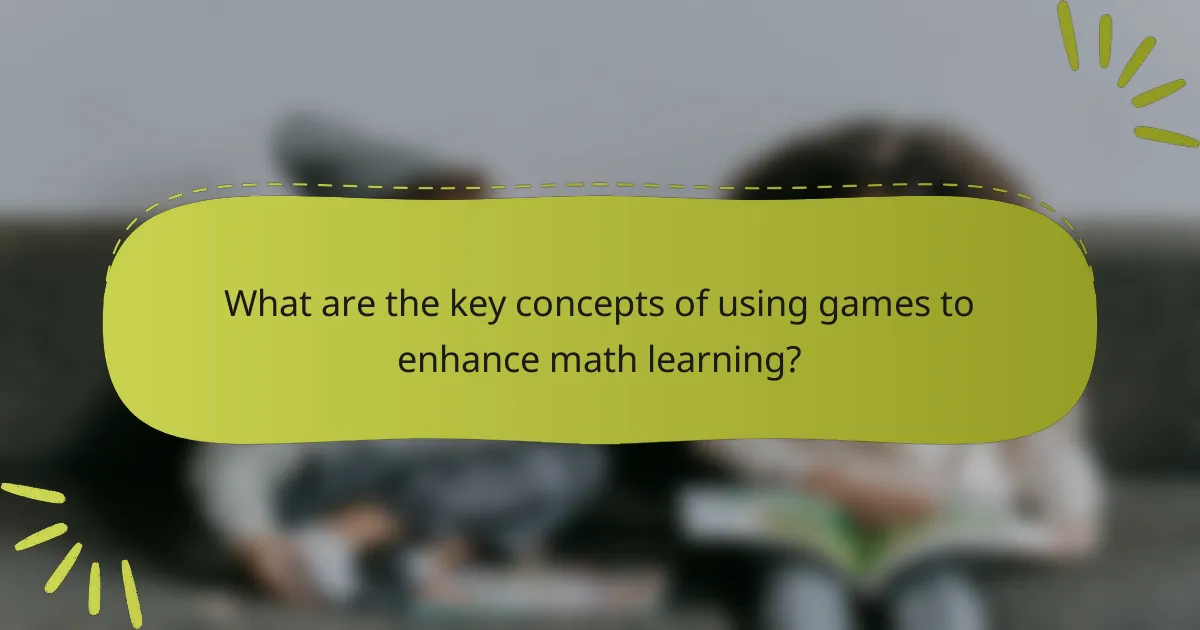
What are the key concepts of using games to enhance math learning?
Using games to enhance math learning involves engaging students through interactive experiences. Key concepts include motivation, immediate feedback, and skill reinforcement. Games create a fun environment that encourages participation. They provide instant feedback, allowing students to learn from mistakes. Additionally, games can adapt to different skill levels, catering to diverse learners. Research shows that game-based learning can improve problem-solving skills and retention of mathematical concepts. For instance, a study by Hamari et al. (2016) found that gamification significantly boosts student engagement and learning outcomes in educational settings.
How do games contribute to the learning process in mathematics?
Games enhance the learning process in mathematics by promoting engagement and motivation. They provide interactive environments for problem-solving and critical thinking. Games also facilitate immediate feedback, allowing students to learn from mistakes. Research indicates that game-based learning can improve retention of mathematical concepts. A study by Hamari et al. (2016) found that gamification increases student motivation and achievement in educational settings. Additionally, games often encourage collaboration among peers, fostering communication skills. This social interaction can lead to deeper understanding through discussion and teamwork. Overall, games serve as effective tools for making math learning enjoyable and effective.
What cognitive skills are developed through math games?
Math games develop various cognitive skills, including problem-solving, critical thinking, and spatial reasoning. These games require players to strategize and make decisions based on mathematical concepts. Engaging with math games enhances memory retention and attention to detail. Players often learn to recognize patterns and relationships between numbers. Research shows that children who play math games demonstrate improved mathematical fluency. Additionally, collaboration in multiplayer math games fosters communication skills. Overall, math games provide a dynamic environment for cognitive skill development.
How do games influence student engagement in math?
Games significantly enhance student engagement in math by making learning interactive and enjoyable. They foster motivation through competition and rewards. Engaging game mechanics encourage active participation, which helps students focus better. Research shows that students who play math games demonstrate improved problem-solving skills. For instance, a study by Hamari et al. (2016) found that gamification increases students’ intrinsic motivation. Games also provide instant feedback, allowing students to learn from mistakes in real-time. This immediate reinforcement can lead to a deeper understanding of mathematical concepts. Overall, games create a dynamic learning environment that promotes engagement and retention in math.
What types of games are effective for math learning?
Interactive math games are effective for math learning. These games engage students in problem-solving and critical thinking. Examples include board games like “Monopoly” and digital games like “Prodigy.” They incorporate math concepts in enjoyable ways. Research shows that game-based learning improves retention and understanding. A study by Hamari et al. (2016) found that gamification enhances student motivation and performance. Additionally, role-playing games encourage collaboration and real-world application of math skills. Overall, diverse game types foster a positive learning environment for math.
What are the categories of math games available?
The categories of math games available include board games, card games, online games, and interactive apps. Board games often involve strategy and problem-solving skills. Card games can enhance arithmetic and number sense. Online games provide engaging platforms for practicing various math concepts. Interactive apps offer personalized learning experiences and immediate feedback. Each category serves to reinforce mathematical skills in a fun and engaging manner.
How do educational board games differ from digital math games?
Educational board games differ from digital math games primarily in their format and interaction style. Board games involve physical components like cards, dice, and boards, promoting face-to-face interaction. Players engage directly with each other, fostering social skills and teamwork.
In contrast, digital math games are played on electronic devices, allowing for interactive graphics and instant feedback. They often include adaptive learning algorithms that adjust difficulty based on the player’s performance.
Research indicates that board games can enhance cognitive and social skills, while digital games can improve engagement and motivation through gamification elements. A study by Hamari et al. (2016) found that digital games significantly increase student motivation in math learning.
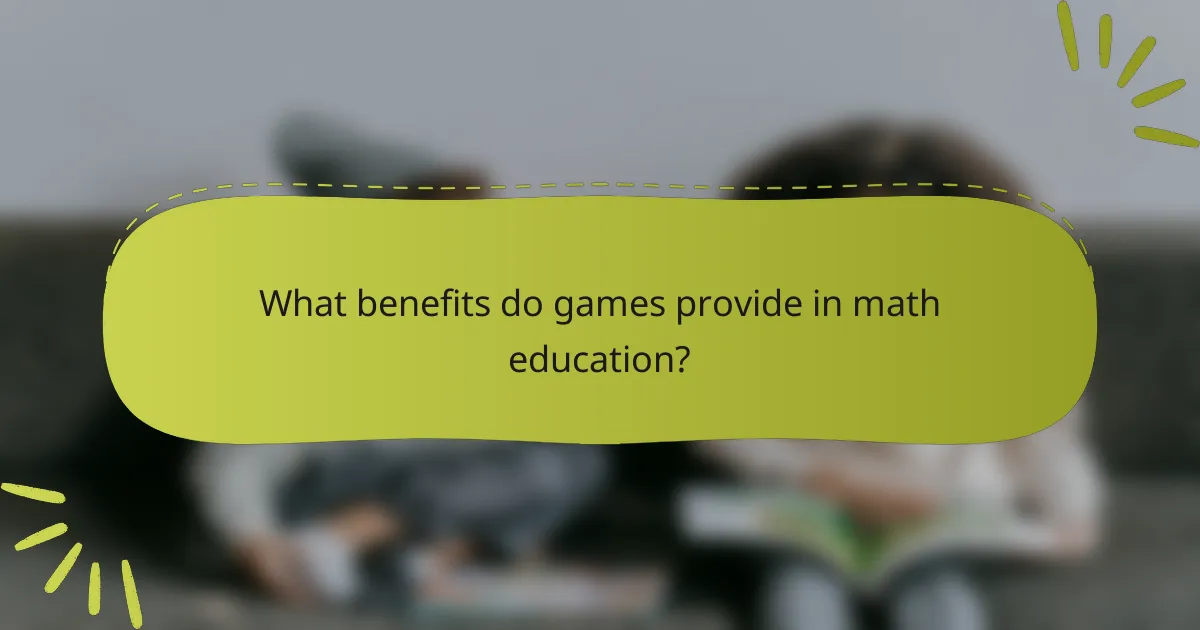
What benefits do games provide in math education?
Games in math education enhance engagement and motivation among students. They provide interactive experiences that make learning enjoyable. This active participation helps improve problem-solving skills. Games also foster collaboration and communication through teamwork. Research shows that students retain concepts better when learned through play. For instance, a study by Hamari et al. (2016) indicates that gamification increases student performance. Additionally, games can cater to different learning styles, making math accessible to all. Overall, integrating games into math education leads to deeper understanding and mastery of concepts.
How do games improve problem-solving skills in students?
Games improve problem-solving skills in students by providing interactive and engaging environments. They encourage critical thinking and strategic planning. Players must analyze situations and make decisions based on available information. This process enhances cognitive flexibility and adaptability. Research shows that game-based learning can lead to improved analytical skills. For example, a study by Hamari et al. (2016) found that students who engaged in educational games demonstrated significant gains in problem-solving abilities. Games often present challenges that require students to devise solutions collaboratively. This social interaction further develops their problem-solving skills. Overall, games create a dynamic learning experience that fosters essential cognitive skills.
What evidence supports the effectiveness of games in learning math?
Games enhance math learning by increasing engagement and motivation. Research shows that students who play math games demonstrate improved problem-solving skills. A study by Hamari et al. (2016) found that game-based learning significantly boosts academic performance. Another research by Squire (2011) indicated that interactive games lead to deeper understanding of mathematical concepts. Additionally, a meta-analysis by Clark et al. (2016) highlighted that game-based learning can improve retention of math skills. These studies provide concrete evidence of the effectiveness of games in learning math.
How do games cater to different learning styles in math?
Games cater to different learning styles in math by providing varied approaches to engagement and understanding. Visual learners benefit from colorful graphics and visual representations of math concepts. Auditory learners gain from games that include verbal instructions and sound effects to reinforce learning. Kinesthetic learners engage through interactive activities that require physical movement or manipulation of objects.
Games often include problem-solving scenarios that appeal to logical-mathematical learners. Collaborative games support social learners by encouraging teamwork and communication. Personalized game settings allow for adaptable difficulty levels, catering to individual learning paces. Research shows that incorporating games in math education can lead to improved retention and understanding, as evidenced by studies indicating enhanced student performance in math assessments when using game-based learning strategies.
Why are games considered a valuable tool in math classrooms?
Games are considered a valuable tool in math classrooms because they enhance student engagement and understanding. They provide interactive experiences that make learning math concepts enjoyable. Research shows that games can improve problem-solving skills and foster critical thinking. According to a study published in the Journal of Educational Psychology, students who participated in game-based learning demonstrated higher math achievement compared to those who did not. Games also encourage collaboration among students, promoting social learning. They can cater to different learning styles, making math accessible to a wider range of students. Overall, the integration of games in math education leads to improved motivation and academic performance.
What role does collaboration play in game-based learning?
Collaboration is essential in game-based learning as it enhances engagement and fosters teamwork. When learners collaborate in game scenarios, they develop critical social skills. They communicate ideas, negotiate strategies, and solve problems together. This interaction leads to deeper understanding and retention of mathematical concepts. Studies show that collaborative learning can improve academic performance. For instance, a study by Johnson and Johnson (1999) indicated that cooperative learning increases student achievement and motivation. Therefore, collaboration not only enriches the gaming experience but also supports educational outcomes in math learning.
How do games help in building a positive attitude towards math?
Games help in building a positive attitude towards math by making learning engaging and interactive. They encourage participation through competition and collaboration. Games often incorporate rewards that boost motivation. This positive reinforcement can lead to increased confidence in math skills. Research shows that students who play math games demonstrate higher interest in the subject. For example, a study published in the Journal of Educational Psychology found that game-based learning improved students’ attitudes towards math. Additionally, games provide immediate feedback, allowing students to learn from mistakes in a low-pressure environment. This approach reduces anxiety associated with traditional math assessments. Overall, games create a fun and supportive atmosphere for math learning.

How can teachers integrate games into their math curriculum?
Teachers can integrate games into their math curriculum by using interactive activities that reinforce mathematical concepts. They can select board games that involve counting, strategy, or probability to engage students. Digital math games can also be utilized to provide immediate feedback and track progress. Teachers may incorporate math-based scavenger hunts to encourage problem-solving in real-world contexts. Collaborative games can promote teamwork while practicing math skills. Regularly scheduled game days can enhance motivation and participation among students. Research shows that game-based learning can improve student achievement in mathematics. A study published in the Journal of Educational Psychology found that students who engaged in game-based learning scored higher on math assessments compared to those who did not.
What strategies can educators use to implement games in math lessons?
Educators can implement games in math lessons by integrating them into the curriculum. This can be achieved through various strategies. First, educators can use digital math games that provide interactive experiences. Research shows that games like Prodigy Math increase engagement and motivation. Second, educators can incorporate board games that focus on math skills, such as Monopoly for financial literacy. These games promote critical thinking and strategic planning. Third, educators can create math challenges or competitions to foster teamwork and problem-solving skills. Studies indicate that collaborative games enhance peer learning. Lastly, educators can use role-playing games to simulate real-life math applications. This approach helps students understand the practical use of math concepts.
How can teachers assess the effectiveness of game-based learning?
Teachers can assess the effectiveness of game-based learning by measuring student engagement and learning outcomes. They can use pre- and post-assessments to evaluate knowledge gained. Observing student interactions during gameplay provides insights into collaboration and problem-solving skills. Teachers can also gather feedback through surveys to understand student perceptions. Analyzing performance data from games can highlight areas of improvement. Additionally, tracking progress over time helps in understanding long-term retention of concepts. Research indicates that game-based learning can improve student motivation and academic performance. For instance, a study by Hamari et al. (2016) found that game-based approaches significantly enhanced learning outcomes in educational settings.
What challenges might arise when using games for math learning?
Challenges in using games for math learning include potential distractions and misalignment with educational goals. Games may engage students but sometimes lack focus on specific math concepts. This can lead to superficial understanding rather than deep learning. Additionally, not all games cater to diverse learning styles. Some students may struggle with the game mechanics rather than the math itself. There is also the risk of unequal participation among students. Some may dominate while others feel left out. Furthermore, assessing learning outcomes from game-based activities can be complicated. Traditional assessment methods may not effectively capture the learning that occurs during gameplay. Lastly, resource availability can be a challenge. Schools may lack access to technology or suitable games that align with their curriculum.
How can teachers overcome potential barriers to game integration?
Teachers can overcome potential barriers to game integration by providing adequate training and resources. Professional development programs can enhance teachers’ skills in using games effectively. Access to technology is crucial for successful integration. Schools should ensure that all classrooms are equipped with necessary devices. Curriculum alignment is also important. Games must align with learning objectives to be effective. Collaboration among teachers can foster sharing of best practices. Joining communities focused on educational games can provide support and resources. Finally, addressing concerns about classroom management can help ease the transition. Clear guidelines and strategies can be established to maintain a productive learning environment.
What are some best practices for using games in math education?
Incorporating games in math education enhances student engagement and understanding. First, align games with specific learning objectives to ensure relevance. Next, choose games that cater to diverse learning styles and abilities. This promotes inclusivity and maximizes participation. Additionally, provide clear instructions and expectations before gameplay. This helps students focus on learning outcomes. Moreover, facilitate discussions post-game to reinforce concepts learned. Research shows that reflection solidifies understanding. Lastly, assess student progress through game performance. This data can guide future instruction and game selection.
How can teachers select appropriate games for their students?
Teachers can select appropriate games for their students by considering educational objectives. They should align games with specific learning goals in math. Assessing the age and skill level of students is crucial. Games must be engaging yet challenging for the intended age group. Evaluating the game’s content for mathematical relevance is essential. Teachers should also consider the game’s format, whether it’s digital or physical. Gathering feedback from students can help in understanding their preferences. Research indicates that games can improve engagement and retention in math learning.
What tips can enhance the game-based learning experience in math?
Incorporating interactive elements can enhance the game-based learning experience in math. Interactive elements engage students actively, promoting deeper understanding. Utilizing adaptive games allows for personalized learning experiences. These games adjust difficulty based on student performance, ensuring appropriate challenges. Implementing collaborative gameplay fosters teamwork and communication skills. Students often learn better when they work together on math problems. Providing immediate feedback within games helps students recognize mistakes and correct them. Research shows that timely feedback significantly improves learning outcomes. Integrating real-world applications within games makes math relevant and relatable. Contextualizing math in everyday scenarios increases student interest and motivation.
The main entity of the article is the use of games to enhance math learning. The article outlines key concepts such as motivation, immediate feedback, and skill reinforcement that games provide in educational settings. It discusses how games contribute to the learning process by promoting engagement, improving problem-solving skills, and catering to diverse learning styles. Additionally, the article categorizes different types of math games, highlights their benefits in fostering collaboration and communication, and offers strategies for teachers to effectively integrate games into their math curriculum. Evidence supporting the effectiveness of game-based learning in enhancing student performance and attitudes towards math is also presented.
